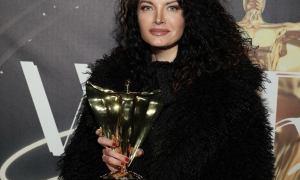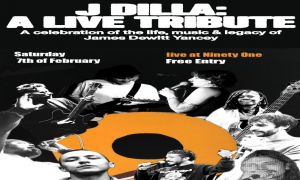+
Sonic Liberation Front
November 10, 2006
8:00 PM
The Five Spot
Philadelphia, PA
www.arsnovaworkshop.com
Kahil El'Zabar's Ritual Trio is not about the return of the fire- breathing brigades of the '60's, come back to reclaim musical space inhabited by a young generation of buttoned-down post-bop clones. It is, rather, a very current version of progressive improvisational music - eclectic in mood and influence, willing and able to look back and reach forward; post-modern in a sense but lacking, thankfully, that overdone post-modern taint, irony. The Ritual Trio does music not just as a function, a gig, but actually a celebration, a ceremony or ritual that codifies their purpose as human beings through the gift of music.
Kahil El'Zabar is one of Chicago's jazz treasures. A member of the AACM, music holds no boundaries for El'Zabar, who has not only played alongside a myriad of jazz greats, but was in the bands of Stevie Wonder, Cannonball Adderley, Dizzy Gillespie, and Nina Simone (who he also designed clothes for), as well as recording with rock bands like Sonia Dada and Poi Dog Pondering and heading up the jazz/house outfit the JUBA Collective. He was also chosen to do the arranging for the stage performances of The Lion King. This is in addition to leading his own longstanding Ethnic Heritage Ensemble and Ritual Trio.
The son of a drummer, El'Zabar took to music at an early age, and was playing with members of the Art Ensemble of Chicago by his teens. While attending college in the early '70s, El'Zabar was given the opportunity to study mime with Marcel Marceau in Paris, but instead opted to use the money to study in Ghana. He started the Ethnic Heritage Ensemble upon his return in 1973, and while the lineup has changed over time, they are still an active group. He has also released a great many albums under his own name, including a long- running relationship with Chicago's great Delmark label. Kahil El'Zabar is not just a master percussionist, either. His efforts as a musician, educator, and community leader led to his being named “Chicagoan of the year" in 2004 by the Chicago Tribune.
Although he plays an instrument that's more closely identified with up-town concert halls than downtown jazz clubs, there's no mistaking the primary source of Billy Bang's musical inspiration. While his violin technique is extensive and his familiarity with contemporary classical forms apparent, Bang's rough-edged, sometimes almost guttural tone, his old-fashioned sense of swing, and his lexicon of vocalic expressive devices define him as a jazz musician. Bang improvises lines that might have been lifted straight from a George Crumb composition, yet he invests them with an emotionalism and spontaneity that is unique to jazz. Whether in the abstract (as a solo violinist, elaborating on skeletal melodic material) or as part of a greater whole (with Sun Ra's Arkestra, for example), a Bang performance is always awash with surprise.
Bang was born in Alabama as Billy Walker, but as an infant moved with his mother to Harlem. Bang was a small youngster, so when he evinced an interest in music as a junior high student, he was given a violin. About this time he began being called Billy Bang after a cartoon character. Prompted by a fascination with Afro-Cuban rhythms, he switched to percussion in the early '60s. As a hardship student at a Massachusetts prep school, Bang played drums with his fellow student, the folksinger Arlo Guthrie. Bang was drafted into the service and was sent to Vietnam. He became radicalized upon returning to the U.S. and worked in the anti-war movement. Bang began playing music again in the late '60s. Bang was inspired by the free jazz of the mid-'60s, especially the music of John Coltrane and Ornette Coleman. The influence of germinal free jazz violinist Leroy Jenkins (and Coleman's violin work) led Bang back to his original instrument. Bang studied with Jenkins and involved himself with the burgeoning New York free jazz scene. He collaborated with saxophonists Sam Rivers and Frank Lowe and performed often in the downtown lofts that often housed the avant-garde music of the day. Bang formed his own group -- the Survival Ensemble -- in the early '70s. In 1977, Bang co-founded (with bassist John Lindberg and guitarist James Emery) the String Trio of New York. It was for his work with the latter group that Bang became best known (he left the band in 1986). He also played with bassist Bill Laswell's Material and drummer Ronald Shannon Jackson's Decoding Society, and led his own groups. In the mid-'80s, Bang played briefly with a funk band called Forbidden Planet. He also collaborated on various projects with pianist Marilyn Crispell, trumpeter Don Cherry, and guitarist James “Blood" Ulmer.
Sonic Liberation Front is a band without peers. The amorphous Philadelphia unit has essentially created its own genre in its evolution as a band. Combining free jazz with Afro-Cuban percussion and modern electronics, Sonic Liberation Front has forged an incredible sound assemblage - one that has sailed to new levels on Change Over Time. While others simply talk of combining the ancient with the futuristic, SLF have done so. More than any other band on the scene today, SLF is continuing on the paths of Sun Ra, Albert Ayler, Ornette Coleman, and Art Ensemble of Chicago - new dimensions of folk art forms of tomorrow.
After previous collaborations with such luminary jazz artists as Sunny Murray, Andy Gonzales, and Badal Roy, SLF recruited veteran saxophonist Julian Pressley (sideman for Illinois Jacquet and Odean Pope) into the fold for Change Over Time. Pressley's contributions to the musical direction of Kevin Diehl, a student of Murray, and Chuckie Joseph, a Yoruban cultural scholar, gives the new version of SLF an incredibly authentic center that the rest of the ensemble build on throughout Change Over Time's eight diverse compositions.
For more information contact All About Jazz.



























